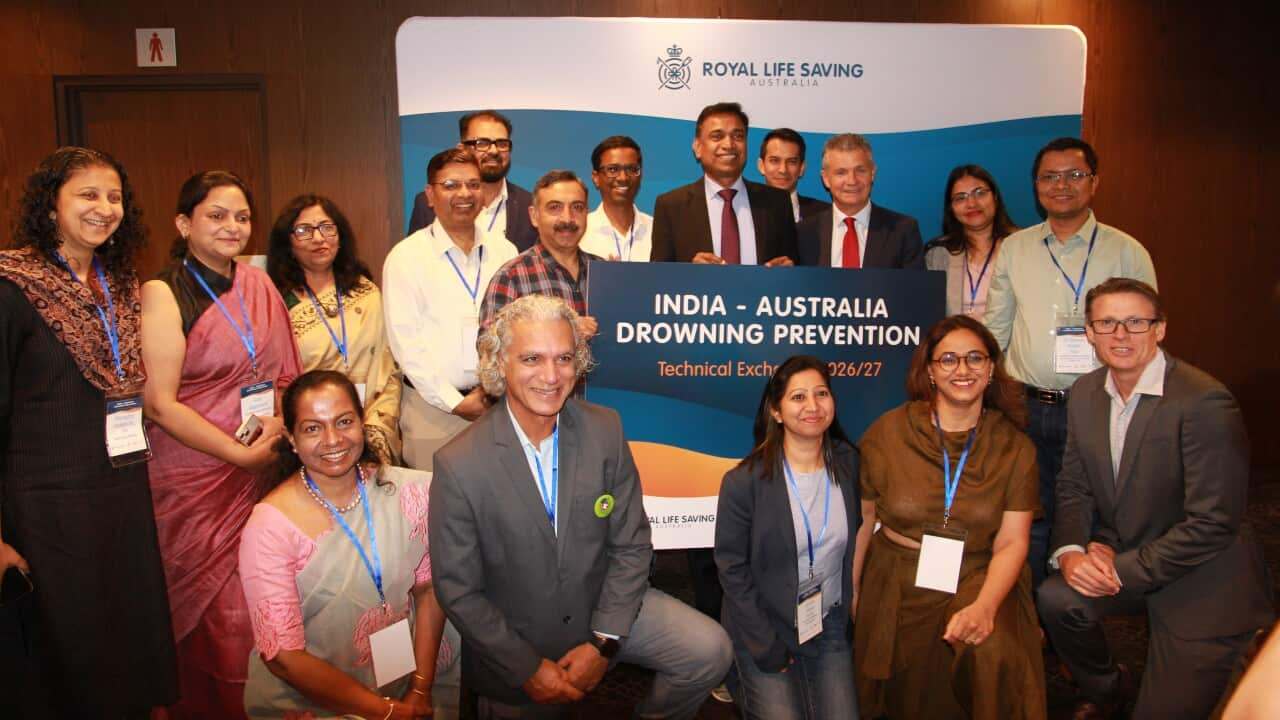Listen to Australian and world news, and follow trending topics with SBS News Podcasts.
TRANSCRIPT
Hand-in-hand as a symbolic gesture of a human chain embracing the shoreline, environmentalists, athletes, and ocean advocates gathered at São Conrado Beach in Rio de Janeiro for a community cleanup.
The initiative - on World Oceans Day - encourages collective action for a better future.
Maria do Carmo is the President of a Recycling Cooperative.
Portuguese translated to English: "(The ocean) to me is everything. If I could I’d clean the whole ocean. The ocean asks for help everyday and we, sometimes out of ignorance, do bad things to our planet Earth."
World Oceans Day was established by the United Nations in 2008 to create global awareness about the importance of protecting oceans and marine ecosystems.
A landmark event - this year, tying in with the third U-N Ocean Conference co-sponsored by France and Costa Rica.
The event, themed Ocean Wonders kicked off with a flotilla of boats from around the globe sail across Nice's Bay of Angels [[June 8 there, June 9 AEST]], ahead of the UNOC3.
Drawing focus to the beauty and importance of the ocean, as conservationists urge world leaders not to lose sight of its value as they make decisions about the planet’s future.
Yann Laurans is the WWF Conservation Director.
"The idea is that the people of the sea, the NGOs of the ocean are together, sailing on the same pace, to the same point, to bring a testimony to the people on the land who are going… or would like them to take important decisions for the ocean."
Hugo Tagholm is the Executive Director of Oceana U-K.
"We're here in France, in Nice, on World Ocean Day for the UN Ocean Conference, and we're hopeful of some big announcements. World leaders are gathering over the coming days to make decisions that could really help protect and restore our seas for the future. Marine-protected areas are effectively biodiversity hotspots, important ecosystems, of course for nature, but also the generators of life that can help support coastal communities around the world. So they're vitally important and it's vitally important that we protect them properly."
The push to ratify the High Seas Treaty - adopted by the United Nations in 2023 -is a key focus at the conference this year.
The pact is seen as a crucial tool to meet a target to protect 30 per cent of the Earth's land and sea by 2030, known as 30 by 30.
At the moment just two-point-seven per cent (2.7%) of the global ocean is effectively protected from destructive activities like industrial fishing and deep-sea mining.
If it comes into effect, the treaty will allow for countries to establish marine protected areas in international waters, which cover nearly two-thirds of the ocean and remain largely ungoverned.
Rebecca Hubbard is the Director of High Seas Alliance.
"The high seas treaty is critical to ensuring that we can protect biodiversity in the ocean that covers half of the planet. There is no law that gives us that ability and right now we're in the middle of a biodiversity and climate crisis and we absolutely have to protect the ocean to be able to address those crises."
Thousands of delegates, including heads of state, scientists, and environmental advocates are in Nice this week [[Mon, June 9 - Fri, June 13]] to confront threats to the ocean, and discuss the need to transform pledges into protection.
As of June 8, only 32 countries out of the 60 total that's needed - had ratified the agreement.
South Korea, France and the European Union have championed the treaty, but most large ocean nations have yet to ratify it, including the rest of the G20.
"The UN Ocean Conference has really been worked towards as a critical milestone on that pathway to getting the treaty entered into force so we're really hoping to get as countries to ratify in the next few days, and as close to or to that 60 magic moment to ensure the treaty can enter into force."
As he welcomed world leaders to the country, French President Emmanuel Macron says it was not a surprise that the U-S decided not to attend the conference.
This, as he faces the pressure for nations to turn decades of promises into real protection for the sea.
His office earlier announced an important announcement would be made in Nice.
"We know the position of the American administration on these topics. Does it prevent us from moving forward? No. I’m always very stoic. I think that we must do what we can do and bring together as many people as we can. The first maritime power is not here. The second maritime power in the world, it’s France, thanks to our overseas territories."
But he says the Trump administration has sent a technical delegate.
"I say the same thing as in 2017: it won’t stop us. So I respect, the American people have elected President Trump. I think it’s good they have a presence (at the conference) and I think it’s better than an empty seat. And we will continue to move forward. It didn’t prevent us from signing a treaty to protect High Seas. We’ve been waiting 15 years to sign a treaty to protect High Seas."
Just a day ago, Prince William was seen alongside the French President at the Blue Economy and Finance Forum in Monaco.
Speaking to climate scientists and experts on the eve of the Ocean conference, he says he is in favour of a moratorium on deep-sea exploitation.
"If we are more or less clear-headed, we are at a time when international science, which still depends a lot on American funding, is withdrawing this funding, where we have a lot of people who are questioning multilateralism and its agencies."
In the U-K, the government is proposing to ban the destructive fishing practice known as bottom trawling in half of England’s protected seas - a move hailed by environmental groups.
It comes after the release of a David Attenborough film featuring rare underwater footage of the devastation to the seabed.
Bottom trawling involves vessels dragging weighted nets over vulnerable habitats, forcing fish, shellfish and unwanted bycatch into a vast trawl net.
Mr Laurans from the WWF says he has witnessed a lot of international conferences that issue a very ambitious text, but with no action.
"We want a text to have teeth to be able to really impose constraints and be accompanied with funding. We need funding. We need money to actually preserve the ocean, we need money to control, money to support the people that live out of the ocean. And that's what we want. We're not sure it will happen yet, so that's why we are putting pressure on all governments."
Speaking at the beach cleanup in Brazil, Jorge Ricardo dos Santos shares his hopes for the future.
Portuguese translated to English: "We’re bringing to Sao Conrado neighbourhood, to Rio de Janeiro, to Brazil, the awareness. If I throw trash here at the beach, it won’t go away, someone will have to pick it up. We need to be focused on nature, the environment, and the oceans to have a better world, a future world for this next generation."













